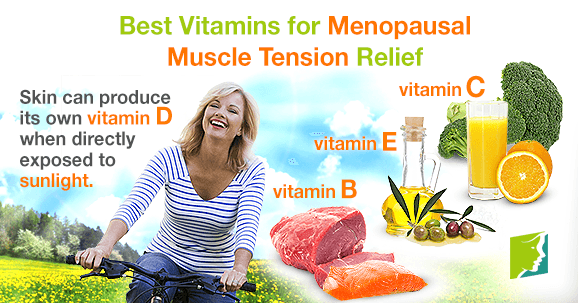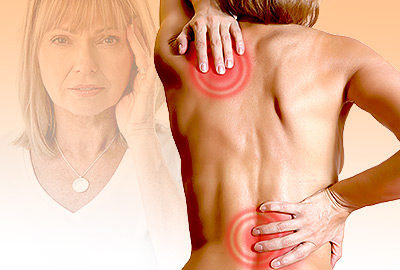Painful and tense muscles during menopause are usually caused by hormonal imbalance, but they can be exacerbated by a variety of factors. Although some may seem obvious, such as exercise habits or lack of sleep, many women are surprised to find that nutritional deficiencies may also be playing a part in the problem. Stress, hectic schedules, and intestinal malabsorption issues mean many women fail to consume the required amount of vitamins in their diet. This may lead to tension and pain in muscles.
However, there are certain vitamins that can help you improve your life and decrease tension.
Vitamin B
Research suggests that women suffering from B-group vitamin deficiencies can have a heightened risk of muscle cramping and tension. Try including vitamins such as pyridoxine (B6) and thiamine (B1) in your diet. The best sources of these are fish, red meat, poultry, and cereals.
Vitamin C
Vitamin C consumption helps your body absorb minerals, which is vital to maintaining good muscle health. Calcium, magnesium, and iron are all essential in the fight to relieve muscle tension, and the more vitamin C consumed, the higher absorption of these minerals. This vitamin is also an antioxidant, so it can reduce inflammation and cell damage. In addition to citrus fruits, vitamin C can be found in high quantities in cabbage, broccoli, and spinach.
Vitamin D
Vitamin D can contribute towards providing relief from muscle tension. Just like vitamin C, vitamin D can help bones to absorb calcium, which is necessary for muscles to relax. Your body can produce vitamin D on its own when exposed to direct sunlight. However, oily fish such as tuna can also provide high amounts of vitamin D.
Vitamin E
Vitamin E works by protecting tissue in the body from damage from toxins. This is due to its high antioxidant quantities. Vitamin E maintains muscle strength, and without it, you may experience more frequent cramping. Try adding some vitamin E to your diet, found in fresh fruit and vegetables, nuts, and olive oil.
Tense muscles can be a frustrating and painful symptom of menopause, though women can experience it during any stage of their lives. One of the best ways to gain relief from muscle tension is to make sure you are consuming enough vitamin B, C, D, and E. A sufficient combination of these vitamins will ensure your body is able to absorb vital minerals, easing your muscle pain.
Sources
- Evert, A. (2011). Vitamin E: MedlinePlus Medical Encyclopedia. Retrieved October 10, 2013, from http://www.nlm.nih.gov/medlineplus/ency/article/002406.htm
- MedlinePlus Supplements. (2011). Pyridoxine (Vitamin B6). Retrieved October 10, 2013, from http://www.nlm.nih.gov/medlineplus/druginfo/natural/934.html
- National Health Service UK. (2013). Back pain - prevention. Retrieved October 10, 2013, from http://www.nhs.uk/Conditions/Back-pain/Pages/Prevention.aspx
- Office of Dietary Supplements. (n.d.). Vitamin C - Health Professional Fact Sheet. Retrieved October 10, 2013, from http://ods.od.nih.gov/factsheets/VitaminC-HealthProfessional/




